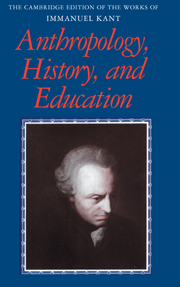Book contents
- Frontmatter
- Contents
- General editors' preface
- Preface
- General introduction
- 1 Observations on the feeling of the beautiful and sublime (1764)
- 2 Essay on the maladies of the head (1764)
- 3 Review of Moscati's work Of the corporeal essential differences between the structure of animals and humans (1771)
- 4 Of the different races of human beings (1775)
- 5 Essays regarding the Philanthropinum (1776/1777)
- 6 A note to physicians (1782)
- 7 Idea for a universal history with a cosmopolitan aim (1784)
- 8 Review of J. G. Herder's Ideas for the philosophy of the history of humanity. Parts 1 and 2 (1785)
- 9 Determination of the concept of a human race (1785)
- 10 Conjectural beginning of human history (1786)
- 11 Some remarks on Ludwig Heinrich Jakob's Examination of Mendelssohn's Morning hours (1786)
- 12 On the philosophers' medicine of the body (1786)
- 13 On the use of teleological principles in philosophy (1788)
- 14 From Soemmerring's On the organ of the soul (1796)
- 15 Anthropology from a pragmatic point of view (1798)
- 16 Postscript to Christian Gottlieb Mielcke's Lithuanian–German and German–Lithuanian dictionary (1800)
- 17 Lectures on pedagogy (1803)
- Editorial notes
- Glossary
- Bibliography
- Index
17 - Lectures on pedagogy (1803)
Published online by Cambridge University Press: 05 May 2013
- Frontmatter
- Contents
- General editors' preface
- Preface
- General introduction
- 1 Observations on the feeling of the beautiful and sublime (1764)
- 2 Essay on the maladies of the head (1764)
- 3 Review of Moscati's work Of the corporeal essential differences between the structure of animals and humans (1771)
- 4 Of the different races of human beings (1775)
- 5 Essays regarding the Philanthropinum (1776/1777)
- 6 A note to physicians (1782)
- 7 Idea for a universal history with a cosmopolitan aim (1784)
- 8 Review of J. G. Herder's Ideas for the philosophy of the history of humanity. Parts 1 and 2 (1785)
- 9 Determination of the concept of a human race (1785)
- 10 Conjectural beginning of human history (1786)
- 11 Some remarks on Ludwig Heinrich Jakob's Examination of Mendelssohn's Morning hours (1786)
- 12 On the philosophers' medicine of the body (1786)
- 13 On the use of teleological principles in philosophy (1788)
- 14 From Soemmerring's On the organ of the soul (1796)
- 15 Anthropology from a pragmatic point of view (1798)
- 16 Postscript to Christian Gottlieb Mielcke's Lithuanian–German and German–Lithuanian dictionary (1800)
- 17 Lectures on pedagogy (1803)
- Editorial notes
- Glossary
- Bibliography
- Index
Summary
TRANSLATOR'S INTRODUCTION
The Lectures on Pedagogy stem from a course on practical pedagogy that the philosophy faculty at the University of Königsberg was required to offer as well as to rotate among its professors. Kant taught the course four times: winter semester 1776–7, summer semester 1780, winter semester 1783–4, winter semester 1786–7. His text the first time he offered the course was Johann Bernhard Basedow's Methodenbuch für Väter und Mütter der Familien und Völker (Altoona and Bremen, 1770). In 1774 Basedow had founded the Philanthropinum Institute in Dessau, a Rousseau-inspired educational experiment that Kant greatly admired. (See also Kant's Essays Regarding the Philanthropinum, pp. 100–4 in this volume.) From 1780 on Kant was required to use his former colleague Friedrich Samuel Bock's book, Lehrbuch der Erziehungskunst zum Gebrauch für christliche Eltern und künftige Jugendlehrer (Königsberg and Leipzig, 1780). However, in keeping with his general practice regarding the “required text rules” that were common at the time, Kant's own lecture notes follow neither Basedow nor Bock at all closely.
Friedrich Wilhelm Schubert, co-editor of the first collected edition of Kant's works, reports that towards the end of his life Kant offered his lecture notes on pedagogy – “which according to the habit of the philosopher consisted in individual scraps of paper (einzelne Papierschnitzel)” – to his younger colleague Friedrich Theodor Rink, “in order to select out from them the most useful ones for the public.
- Type
- Chapter
- Information
- Anthropology, History, and Education , pp. 434 - 485Publisher: Cambridge University PressPrint publication year: 2007
- 12
- Cited by

